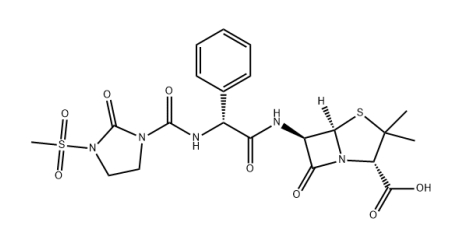Mezlocillin has a similar antimicrobial profile to piperacillin, with better activity against Enterobacteriaceae and less activity against Pseudomonas aeruginosa than oxacillin. It is used in medicine for respiratory tract infection and urinary tract infection caused by sensitive bacteria.
Scope of application
Mezlocillin is mainly used for bacterial infections in respiratory system, urinary system, digestive system, gynecological and reproductive organs caused by sensitive strains of Gram-negative bacilli such as Escherichia coli, Pseudomonas aeruginosa, Enterobacter and Proteus. For septicemia, purulent meningitis, peritonitis, osteomyelitis, skin and soft tissue infection, ophthalmology and otorhinolaryngology virus infection and other diseases have a good therapeutic effect.
Mezlocillin sodium is usually administered by vigorous injection or intravenous injection, but can also be given by intravenous drip. For adults, 2-6g of mezlocillin sodium should be used at a time, which can be increased to 8-12g if the infection is severe, and up to 15g. The child can take the drug according to the weight of the daily dose of 0.1 to 0.2 grams per kilogram, and if the infection is more severe, it can be increased to 0.3 grams per kilogram. The drug can be taken 2 to 4 times per day by intramuscular injection, and once every 6 to 8 hours by intravenous infusion.
Adverse reactions
Adverse reactions were rare, including skin rash, hot, retching, abdominal distension, abdominal pain, soft stool, diarrhea, and elevated transaminase. Allergic symptoms such as rashes, itching. “Prolonged bleeding, purpura or mucosal bleeding, leukopenia or agranulocytosis, anemia, or thrombocytopenia are rare.”
English name: Mezlocillin
No. : GT-A0054
CAS number: 51481-65-3
Molecular formula: C21H25N5O8S2
Molecular weight: 539.58
Post time: Jan-18-2024

